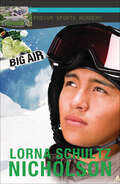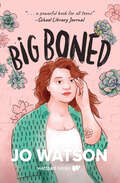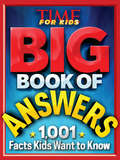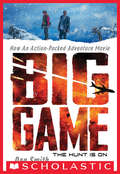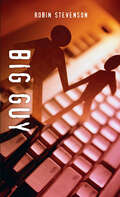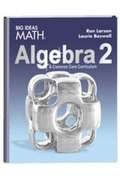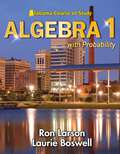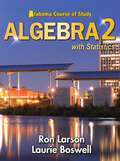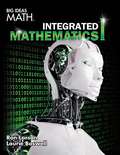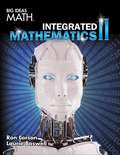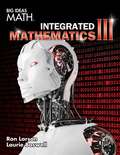- Table View
- List View
Big Air (Lorimer Podium Sports Academy)
by Lorna Schultz NicholsonAboriginal snowboarder Jax has it made. He's in his last year at Podium Sports Academy and he's got a sponsorship from a big snowboarding company in the bag. But then his older brother, always the troublemaker in the family, shows up in Calgary unexpectedly. Suddenly Jax's sponsorship is threatened when the police come asking questions about a break-in at the house where he lives. He wants to help his brother, but will it cost him his future as a professional boarder? Distributed in the U.S by Lerner Publishing Group
Big Boned
by Jo WatsonCan she be herself in a one-size-fits-all world?Lori Palmer is the new girl at Bay Water High, where students prize glossy hair, “beach” bodies, and thigh gaps above all else, which is so not her. She misses her old school, where her artistic talent was more important to her peers than a chia smoothie recipe ever was.Uncomfortable in her own size-sixteen skin, Lori decides to survive senior year as best she can by blending into the background while she melts in the summer heat. But her plans go completely awry when she discovers popular jock Jake volunteering at her brother Zac’s school. When her brother befriends Jake’s sister, Lori is suddenly thrust into Jake’s unfamiliar world of water polo, parties, and stargazing.As she grows closer to Jake, and her relationship with her mother starts to deteriorate, Lori’s old anxieties resurface and she throws herself into her art. It’s a wildly new direction for Lori, and through it she realizes that finding her voice might get her into a world of trouble, but standing up for what she believes in is as important as standing up for herself.
Big Book of Answers: 1,001 Facts Kids Want to Know (Time For Kids Big Bks.)
by Editors of TIME For Kids MagazineIn a great new oversized format, TIME For Kids Big Book of Answers satisfies the most curious kids with answers to the questions they commonly ask but adults can rarely answer. Questions like ""How does popcorn pop?"", ""Where did the Titanic sink?"" and ""Why are our eyes different colors?"" are grouped into easy-to-navigate categories such as animals, humans, history, science and sports. Colorful photos, dynamic graphics, and simple text help kids discover 1,001 amazing facts to impress their parents, teachers, friends...and anyone else who will listen
Big Game: Movie Tie-in Edition
by Dan SmithA boy hunter, the president of the United States, and a terrorist plot converge to create an original and thrilling tale of wilderness survivalEvery boy in Oskari's remote mountain village must face a ritual hunt on his thirteenth birthday--the Trial--to become a man. It's Oskari's turn, and whatever animal he kills--if he succeeds--will symbolize who he will become. But the idea of spending a night alone in the forest makes him queasy, and the ceremonial bow he has to use is too big for him. Not long after he sets out, Oskari comes across a strange creature in the woods, emerging in eerie blue light from a smoking steel pod. He assumes it's an alien, until the figure introduces himself . . . as the president of the United States. Air Force One, sabotaged, has crashed, and the president is running for his life. Will Oskari be brave enough, strong enough, and smart enough to save the president and himself?Soon to be a major motion picture starring Samuel L. Jackson as President of the United States!
Big Guy (Orca Soundings)
by Robin StevensonDerek thinks he might be falling in love. The problem is, he hasn't been entirely honest with his online boyfriend. Derek sent Ethan a photo taken before he got depressed and gained eighty pounds. Derek hasn't been honest with his employer either. When he lied about his age and experience to get a job with disabled adults, the last thing he expected was to meet a woman like Aaliyah. Smart, prickly and often difficult, Aaliyah challenges Derek's ideas about honesty and trust. Derek has to choose whether to risk telling the truth or to give up the most important relationship in his life.
Big Ideas Algebra 2 (Big Ideas Math Algebra 2 Ser.)
by Ron Larson Houghton Mifflin Harcourt Publishing Company StaffConsistent with the philosophy of the Common Core State Standards and Standards for Mathematical Practice, the Big Ideas Math Student Edition provides students with diverse opportunities to develop problem-solving and communication skills through deductive reasoning and exploration. Students gain a deeper understanding of math concepts by narrowing their focus to fewer topics at each grade level. Students master content through inductive reasoning opportunities, engaging activites that provide deeper understanding, concise, stepped-out examples, rich, thought-provoking exercises, and a continual building on what has previously been taught.
Big Ideas Math Algebra 1, A Common Core Curriculum
by Ron Larson Laurie BoswellBig Ideas Math Algebra 1 is a research-based program providing a rigorous, focused, and coherent curriculum for high school students.
Big Ideas Math: A Common Core Curriculum, Algebra 1
by Ron Larson Laurie BoswellNIMAC-sourced textbook
Big Ideas Math: A Common Core Curriculum, Algebra 1
by Ron Larson Laurie BoswellNIMAC-sourced textbook
Big Ideas Math: A Common Core Curriculum, Algebra 1 (Big Ideas Math Algebra 1 Ser.)
by Ron Larson Laurie BoswellNIMAC-sourced textbook
Big Ideas Math: A Common Core Curriculum, Algebra 2
by Ron Larson Laurie BoswellNIMAC-sourced textbook. <P> <i>Advisory: Bookshare has learned that this book offers only partial accessibility. We have kept it in the collection because it is useful for some of our members. To explore further access options with us, please contact us through the Book Quality link on the right sidebar. Benetech is actively working on projects to improve accessibility issues such as these. </i>
Big Ideas Math: A Common Core Curriculum, Geometry
by Ron Larson Laurie BoswellNIMAC-sourced textbook
